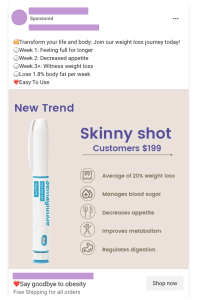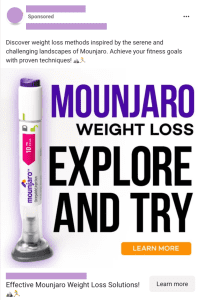The Ministry of Health (MOH) of Singapore has prohibited advertisements for prescription-only weight-loss medications, citing concerns over misleading claims that could endanger public health.
Several companies, including Novi Health, Ora Group, and Ordinary Folk, have faced scrutiny for promoting weight-loss drugs on telehealth platforms.
“These advertisements may not be conveyed in any form of media, including digital media such as websites, social media platforms and telehealth platforms,”said MOH and the Health Sciences Authority (HSA) in a joint statement, as reported by The Straits Times (ST).
Some advertisements showcased glucagon-like peptide-1 (GLP-1) receptor agonists like Saxenda and Ozempic, injectable medications commonly used for weight loss.
To circumvent regulations, these ads used indirect language, referring to the medication as a “weight-loss pen” and sometimes masking product identifiers in images.
Why MOH Enforced the Ban on Weight-Loss Drug Ads
The crackdown on weight-loss drug advertisements aims to address the increasing prevalence of misleading promotional tactics. According to ST, online ads often emphasise rapid weight loss, highlighting results that are unsubstantiated or exaggerated.
These include claims like “Lose 20% of body weight” or “Drop kilos fast” without adequate clinical evidence to back such statements.
Some advertisements further complicated the issue by using creative methods to bypass regulatory oversight. MOH and HSA noted that “publication of information that promotes the sales or use of specific brands of medicines, whether directly or indirectly… is also disallowed.” This includes using misspellings, euphemisms, or obscured product images to subtly market prescription-only drugs.
Beyond legal concerns, the health authorities cited the potential harm to vulnerable individuals. Dr Tina Tan, a senior consultant psychiatrist at Better Life Clinic, shared with ST about the risks these ads pose, especially to those with eating disorders. She explained:
“In the vast majority of cases, one of the primary desires of such patients is to lose weight… Such consumption does not address the underlying psychological issues these patients are dealing with and can potentially cause harm.”
How to Spot Red Flags in Online Weight-Loss Drug Ads
The rise of online advertisements for weight-loss drugs and other treatment has made it more important than ever for consumers to distinguish legitimate medical advice from potentially harmful marketing. Many ads employ subtle tactics to sidestep regulations, creating confusion about the products they promote.
For instance, some ads use euphemisms like “skinny shot” to hint at prescription medications without naming them explicitly.

This ad for a “Skinny Shot” promotes weight-loss claims such as losing 1.8% body fat weekly. It references an injectable pen while avoiding clear naming of a prescription drug, a tactic that may mislead consumers about the product’s medical supervision requirements.*
Other ads include images of unlabelled pens or cleverly masked product identifiers to imply easy accessibility without disclosing the need for medical supervision.

This ad implies easy access to a prescription-only drug, focusing on fitness goals, without disclosing the need for medical consultation or approval.*
These types of advertisements often overpromise results, such as rapid weight loss or dramatic improvements in metabolism, without providing evidence to substantiate these claims. Additionally, the absence of references to licensed healthcare professionals is a significant red flag that consumers should recognise.
How to Protect Yourself from Questionable Health Ads
Consumers can take charge of their health by learning to assess the accuracy and reliability of online advertisements. Identifying red flags and understanding what to look for ensures that healthcare decisions are based on credible information and professional advice. Here are practical steps to evaluate health ads and make informed choices:
1. Verify the Source
Ensure the ad comes from a credible source, such as a government agency, a reputable healthcare organisation, or a licensed medical provider. Be cautious of ads from unfamiliar websites or platforms without verifiable credentials.
2. Look for Medical Oversight
Authentic health products and treatments always emphasise consultation with a licensed doctor or pharmacist. Be wary of ads that suggest treatments can be used without professional guidance.
3. Watch for Unrealistic Claims
Statements promising fast results or dramatic changes can create unrealistic expectations about what medical treatments can achieve. These claims often oversimplify complex health issues, overlooking the importance of sustainable and personalised care.
4. Check for Clear Disclaimers
Legitimate advertisements include transparent disclaimers about the product’s use, limitations, and possible risks. Ads without such details may not provide the full picture of the treatment.
5. Be Cautious of Financial Incentives
Offers such as instalment plans or discounts (e.g., “Buy now, pay later”) can make treatments appear accessible but may not prioritise the safety and appropriateness of the product. Always consider the medical necessity of a treatment over cost incentives.
Making Health Decisions with Confidence
Choosing safe and effective treatments begins with understanding the importance of credible information and professional guidance.
By recognising questionable tactics in advertisements and focusing on evidence-based advice, consumers can avoid unnecessary risks and make informed decisions about their health. Always consult trusted healthcare professionals and rely on reputable platforms for accurate and unbiased information.
*The images of weight-loss advertisements highlight some concerning practices discussed earlier. These ads are not linked to the companies mentioned in this article and do not originate from Singapore. Medical Channel Asia found that these ads do not belong to healthcare providers or clinics in Singapore. However, they were targeted at a Singaporean audience via Facebook.
Learn more about weight-loss medications
- Hollywood’s Interest in Ozempic: Celebrities and the Debate Over Diabetes Medication for Weight Loss
- FDA Warns Against Non-Branded Alternatives of Ozempic and Wegovy
- 5 Common Nutrient Deficiencies to Watch For on GLP-1 Weight Loss Drugs
- Indonesia’s Actress Prilly Latuconsina Achieves Weight Loss without Strict Dieting

